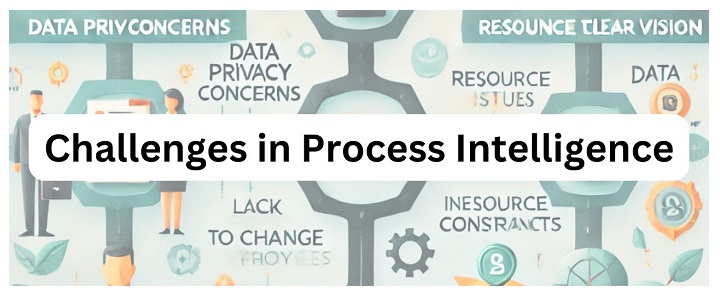
- Process Intelligence - Home
- Process Intelligence - Introduction
- Process Intelligence vs Process Mining
- Process Intelligence - Data Collection
- Process Intelligence - Tools
- Process Intelligence - Applications
- Process Intelligence - Benefits
- Process Intelligence - Challenges
Process Intelligence Challenges
It can be a challenging effort to implement Process Intelligence in a business organization. These challenges can be related to data privacy concerns to employee's resistance to changes and availability of resources. Each of these challenges makes it difficult to adopt and implement process intelligence.

This chapter highlights the major challenges in process intelligence implementation and will try to provide causes and strategies to reduce them.
Challenges in Process Intelligence Implementation
The key challenges that business organizations face while implementing process intelligence are explained below −
Data Privacy Concerns
It is one of the most significant challenges in process intelligence. As we know, data collection and analysis are the foundations of process intelligence. Business organizations have several sensitive data like financial records, personal information of employees, intellectual properties, etc. that must be confidential and protected securely. However, process intelligence, being distributed across various departments, can lead risks of data breaches or misuse.
The primary cause behind unauthorized data access is the improper implementation of access control to sensitive data within the organization. However, by implement proper data encryption, masking personal data, and ensuring adherence to compliance can significantly reduce the data privacy concerns in process intelligence.
Resistance to Change from Employees
The adoption or implementation of new technologies like process intelligence within a business organization is resisted by employees due to fear of job displacement, learning complexities in new technologies, changing job roles, etc. However, this challenge can be addressed effectively by educating employees on benefits of process intelligence and encouraging them to use it as a collaborative tool to enhance their work capabilities.
Lack of Clear Vision
Sometimes, business organizations find themselves incapable in understanding how process intelligence will align with their business objectives. This impacts the successful implementation of process intelligence within the organization.
The main cause behind this challenge is starting implementation of process intelligence without having a clear objective and roadmap. Although, businesses can overcome this issue by defining a clear goal for process intelligence according to their business needs and making necessary changes based on feedbacks.
Resource Constraints
Process intelligence requires significant resources like technologies, tools, investment, and experts for successful implantation. Making these resources available becomes a challenge for small- and mid-sized business organizations.
However, by adopting some solutions like using cloud-based tools and technologies, taking freelance expert services, investing in high-impact processes first and then scale gradually, etc. can play an important role in addressing this challenge and implementing process intelligence.
Inadequate Data
Process Intelligence is a data-driven technology. The operation of process intelligence systems is completely dependent on accurate and detailed process data. If the available data is inadequate or of low-quality, then it can result in poor-quality performance analytics, inaccurate insights, and ineffective recommendations on process optimization.
This challenge can be effectively mitigated by following practices like data cleaning, integrating data from various sources, and implementing data governance policies.
Conclusion
In this chapter, we provided a basic overview of the kind of challenges in process intelligence implementation such as data privacy concerns, data quality issues, resistance to change, etc.
Business organizations can try to address these challenges with well-planed strategies to implement successful process intelligence and drive business excellence and long-term sustainability.